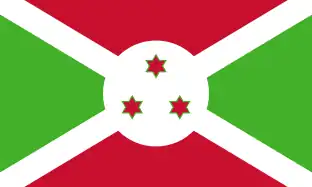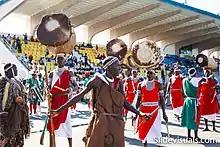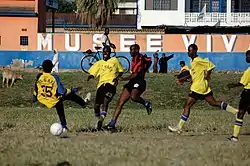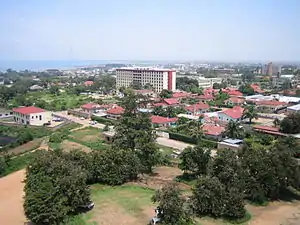| Part of a series on the |
| Culture of Burundi |
|---|
 |
| People |
| Languages |
| Cuisine |
| Religion |
| Art |
| Music |
| Sport |
The culture of Burundi is based on local tradition and common influence with its neighbors.
People
Although referred to as ethnic groups the Hutu, the Tutsi, the Twa, and the Ganwa all share the same culture, language and land. In Kirundi, the national language of Burundi, these ethnic groups are called miryango, which can be translated to clans or tribe.[1]
Pre-colonial society
Before colonization Burundi and Rwanda formed one kingdom, Ruanda-Urundi. The Burundian part of society was ruled by Kings also called Mwami.[2] There are no records of discrimination during this time. Every clan was involved in royal duties, for inclusion purposes. While there were physical differences between clans, they all shared to same customs and beliefs.[3]
Colonial society
Burundi's colonization started in the early 19th century, which is later than most African countries.[3] First, German colonizers were assigned Rwanda and Burundi at the Berlin Conference of 1884/1885.[1] Belgians than took over the colony after the World War I. Both colonizers implemented Christianity and a new hierarchical order, by making traditional ceremonies illegal and by placing large barriers to between clans. [3]
Music
Burundi has a wide range of music, from traditional percussions to modern music. Drums are the main instruments in Burundi, because of the heritage of the Royal Drummers of Burundi, a group of musicians that play the instrument, sing and dance. In the precolonial period, the drummers would often play for the Kings and royal families, Royal drummers would announce the beginning of the day and the ending of the day. They would also play during special spiritual events such as enthronements or the beginning of the agricultural season. To this day, Burundians still celebrate important events with drummers. [4] The Intangible Cultural Heritage of UNESCO in 2014 added the drummers' practices to their list.[5]

In 2017, a decree was passed by the government, legally banned women from beating drums as it was explained to be a men's activity, despite the centuries-long tradition of female drum-players in the country.[5]
Burundian women greet each other in an interlocking rhythmic vocal form called akazehe.[6]
Media
Literature and oral tradition
During the 1972 genocide, many Burundians involved in higher education were killed, stalling written culture. This combined with the lower literacy rate have encouraged an adherence to Burundi's strong oral tradition, which relays history and life lessons through storytelling, poetry, and song. This is evident in kivivuga amazina, an improvisational poetry contest played by cattle herders, in which they boast their abilities or accomplishments.
Sports

Football is a popular pastime throughout the country, as are mancala games. Many Burundians celebrate Christian holidays and Burundian Independence Day, though the largest celebration occurs on New Year's Day with feasting and traditional drumming and dancing.
Burundi's women's national volleyball team lastly qualified for the 2021 Women's African Nations Volleyball Championship.[7]
Cuisine
Burundian cuisine utilises maize and bananas as staple foods and often contains red kidney beans.[8] Meals are not usually accompanied by sweet foods or dessert. During celebrations and gatherings, Burundians drink homemade banana wine and beer, sometimes drinking through straws from a single large container.
In some areas, brochettes and frites are a popular remnant of the Belgian colonial period. The presence of Lake Tanganyika Lake Tanganyika adds fish such as ngangara and mukeke to Burundian cuisine. A national brewery produces Primus and Amstel beers.[9]
Education and environment

Burundi has the University of Burundi. There are several museums in the cities, such as the Burundi Geological Museum in Bujumbura and the Burundi National Museum and the Burundi Museum of Life in Gitega. Adult literacy is at about half among men and about a quarter among women.
There are several wildlife and nature preserves, and the southern town of Rutana contains a monument to the source of the Nile River.
Visual arts
See also
Bibliography
- Marsh, Ian. (2015) . Africa [3 volumes]: An Encyclopedia of Culture and Society: Bloomsbury Academic.[10]
- This is an encyclopedia book that was published by an independent publisher. It should be reliable. It covers the topic of Burundian culture and music and dance, it can be used to establish notability.
- Mbonyingingo, Audace; Ntiranyibagira, Constantin. (2020). Beating Drums or Beating Women? An Analysis of the Drum Universe in Burundi. (2020). Journal of Postcolonial Writing and World Literatures, 1(1), 15-30. https://royalliteglobal.com/world-literatures/article/view/50[11]
- This scholarly article was published in an academic journal. It should be reliable. The article debates about the culture of music in Burundi and how it can be discriminatory against women.
- Maguire, L. (1995). Power ethnicized: the pursuit of protection and participation in Rwanda and Burundi. Buffalo Journal of International Law, 2(1), 49-90.[3]
- This is an article that was published by an academic law journal, so it should be reliable. This article talks about the power of concepts and words like ethnicity in Burundi, So it should help establish notability.
- Sentamba, E., & Kilonzo, Susan M. (2023). The palgrave handbook of religion, peacebuilding, and development in Africa. In Country case studies on religion, peacebuilding and development in Africa (pp. 199–216). essay, Springer International Publishing. [1]
- This is a section in a book published by a scientific publishing company, so it should be reliable. This section discusses the impact of colonization on Burundi and the population's religious systems, it should help establish notability.
- Albert, E. M. (1964). “Rhetoric,” “Logic,” and “Poetics” in Burundi: Culture Patterning of Speech Behavior. American Anthropologist, 66(6), 35–54. http://www.jstor.org/stable/668160[2]
- This article was published by a peer-reviewed journal, it should be reliable. This article takes a deep look into the traditional culture of Burundi culture of Burundi, it should help establish notability.
References
- 1 2 3 Sentamba, Elias (2023), Kilonzo, Susan M.; Chitando, Ezra; Tarusarira, Joram (eds.), "Ethnic and Political Conflicts Resolution in Burundi: The Contribution of Religious Organisations", The Palgrave Handbook of Religion, Peacebuilding, and Development in Africa, Cham: Springer International Publishing, pp. 199–216, doi:10.1007/978-3-031-36829-5_12, ISBN 978-3-031-36829-5, retrieved 2023-11-12
- 1 2 Albert, Ethel M. (1964). ""Rhetoric," "Logic," and "Poetics" in Burundi: Culture Patterning of Speech Behavior". American Anthropologist. 66 (6): 35–54. ISSN 0002-7294. JSTOR 668160.
- 1 2 3 4 Maguire, Linda (1995-04-01). "Power Ethnicized: The Pursuit of Protection and Participation in Rwanda and Burundi". Buffalo Journal of International Law. 2 (1): 49. ISSN 1074-4835.
- ↑ Falola, Toyin; Jean-Jacques, Daniel (2015-12-14). Africa [3 volumes]: An Encyclopedia of Culture and Society [3 volumes]. Bloomsbury Publishing USA. ISBN 978-1-59884-666-9.
- 1 2 Mbonyingingo, Audace; Constantin, Ntiranyibagira (2020-02-15). "Beating Drums or Beating Women? An Analysis of the Drum Universe in Burundi". Journal of Postcolonial Writing and World Literatures. 1 (1): 15–30.
- ↑ Facci, Serena; Ciucci, Alessandra (2020). "The Akazehe of Burundi: Polyphonic Interlocking Greetings and the Female Ceremonial". Ethnomusicology Translations (10): 1–37 – via IUScholarWorks Journals.
- ↑ "Rwanda Kicks Off Quest for Africa Women's Volleyball Championship Against Morocco". Damas Sikubwabo (AllAfrica). 12 September 2021. Retrieved 18 October 2021.
- ↑ James McCann (2005). Maize and Grace. Harvard University Press. ISBN 978-0-674-02557-8.
- ↑ Mary Fitzpatrick; Tom Parkinson (June 2006). the quiet planet. me. p. 607. ISBN 978-1-74104-286-3.
- ↑ Falola, Toyin; Jean-Jacques, Daniel (2016). Africa: an encyclopedia of culture and society. Santa Barbara, Calif: ABC-CLIO, an imprint of ABC-CLIO, LLC. ISBN 978-1-59884-665-2.
- ↑ Mbonyingingo, Audace; Constantin, Ntiranyibagira (2020-02-15). "Beating Drums or Beating Women? An Analysis of the Drum Universe in Burundi". Journal of Postcolonial Writing and World Literatures. 1 (1): 15–30.